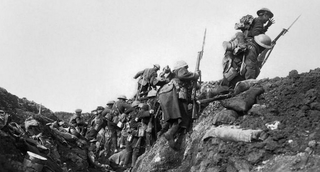Anxiety
To Commemorate WWI, Silence Is the Best Symbol
Noise has always been a brutal weapon; peace demands its opposite.
Posted July 4, 2016

A minute of silence in the killing fields of France.
This was the most fitting tribute to the nearly one and a half million soldiers who died uselessly in the Battle of the Somme, in World War I, a century ago this weekend; almost 20,000 British troops, a large percentage of them in their teens, were slaughtered in the first day of the battle.
Britain's Guardian newspaper described it thus: "The absolute silence of 10,000 people is an immensely powerful sound, and shortly before 1pm local time on Friday (July 1), amid an international ceremony full of pomp and military honours, it was that moment of stillness that provided the most eloquent memorial to the horrors perpetrated at the Battle of the Somme exactly 100 years ago."
The horrors of war are constantly cited, a sort of mantra, by pacifists and other critics of conflict but what we often overlook is the mind-numbing noise of conflict: the Somme and other massed assaults of WWI provided some of the loudest environments ever created by humans.
The British began their assault by detonating the Lochnagar mine, a giant explosive device they had buried under German lines; the resulting explosion was said to be the greatest single man-made noise ever devised.
The Lochnagar explosion, as well as the firing of giant guns in the fields of France, could be heard in London.
And noise, to some extent, was the point. Excessive noise disorients, eliminates rational thought, induces panic. It clogs the senses, makes the victim of noise unable to discern other sensory input. To a commanding officer's way of thinking, it freezes opposing troops and makes his own, to the extent they can hear anything afterward, more amenable to orders--even idiotic orders.
Our own military knows this. In Afghanistan they backed up containers filled with sound equipment to the mouths of caves in which suspected Islamist fighters were hiding and played the Barney theme song at ear-splitting levels to neutralize opponents. The CIA did the same, as a form of torture, to prisoners they were interrogating. The Israeli air force, to keep Palestinians off-balance, made a practice of flying supersonic fighters over Gaza, setting off sonic booms, or sound bombs, that according to witnesses caused vomiting, panic, heart problems among sick people, and miscarriages in pregnant women.
Other forms of noise cause war. The barrage of pro-war propaganda, in TV sound bites, jingoistic radio broadcasts, and print, all unleashed by the GW Bush White House, drowned out the softer voices reminding us of the facts. As a result almost 3,000 American troops, and several hundred thousand Iraqi civilians, died to invade a country that, as the Pentagon determined later, had absolutely no connection to the Sept. 11 World Trade Center attacks and posed no viable threat to anyone else, including Israel.
Today, the 4th of July, Americans will celebrate their independence from a colonial power, and justifiably so. They will watch red-glaring rockets and sing a song that celebrates the "bombs bursting in air" around Fort McHenry in the War of 1812--a war that, incidentally, the US lost.
It would behoove us all, at this time of national celebration, to think about the extent to which we want this country to be an agent of peace, or of war; and if it is to be peace, then observe a moment of silence--the antithesis of martial noise--to think, quietly, rationally, about how to make it so.


